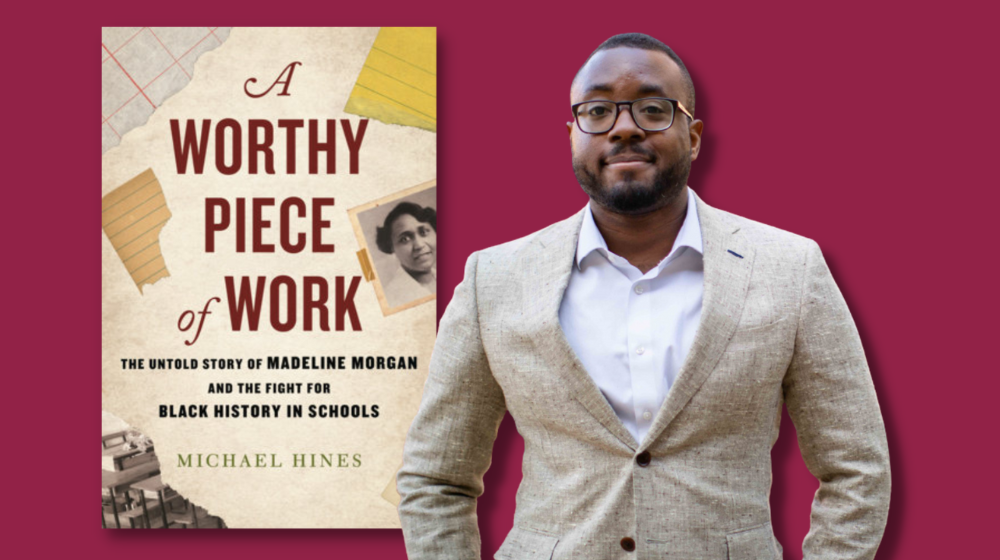
Black History Education in Chicago
Black History Education in Chicago
Thursday, April 13th, 2023 from 5 - 6:30 p.m.
As recent book bans, controversies over K-12 history curricula, and assaults on Critical Race Theory have shown, educators and the nation at large are engaged in a difficult but long overdue dialogue about how we teach the past, especially the histories of Black Americans. Focusing solely on the present, however, ignores the fact that these current debates are part of a much longer struggle. Chicago itself has a rich and revealing story of Black history education stretching back almost a century, one that practitioners, policy makers, students and parents can learn from.

A Worthy Piece of Work
Join Michael Hines, author of A Worthy Piece of Work: The Untold Story of Madeline Morgan and the Fight for Black History in Schools, for a discussion of Black history instruction in the Chicago schools', past, present, and future. Hines will be joined by associate professor of education and former CPS social studies teacher Charles Tocci and historian, educator, and former CEO of the DuSable History museum Carol Adams. Together, the panel will excavate the long battle for Black history education in Chicago and use the past to predict how this struggle will continue to unfold in the present and future.
GUEST SPEAKERS

Panelists (left to right): Carol Adams,Michael Hines, and Charlie Tocci.
Michael Hines, PhD
Assistant Professor, Stanford Graduate School of Education
Michael Hines is a historian of ed. and assistant professor at the Stanford Graduate School of Education. He earned his B.A. in History from Washington University in St. Louis, and his M.A. and PhD in Cultural and Educational Policy Studies from Loyola University Chicago. He completed a Postdoctoral Fellowship in History and Education at Teachers College, Columbia University. Prior to pursuing graduate studies, Dr. Hines worked as an ELA and World History teacher in Washington D.C. and Prince George's County Maryland. Currently his research focuses on how African Americans in the early twentieth century created new curricular discourses around race and historical representation. His work has been published in popular outlets such as ChalkBeat, TIME, and the Washington Post, along with scholarly publications including the Journal of African American History, Review of Educational Research, History of Education Quarterly, and the Journal of the History Childhood and Youth. His first book, A Worthy Piece of Work, from Beacon Press, was released earlier this year.
Carol Adams, Phd
President and CEO, Urban Perspectives
As one of the nation’s most esteemed educators, Dr. Carol L. Adams helped to bring about the convergence of art and education in Chicago, particularly in its museums and public schools. In 1968, Adams began her career in academia as the research director for the Center for Inner City Studies (CICS) at Northeastern Illinois University. Adams went on to spend several years as the first director of research and planning for the Neighborhood Institute, a division of South Shore Bank (later the Shorebank Institute.
In 1981, Adams returned to academia as the director for Loyola University’s African-American studies program, a position she held until 1988. She then served as dean of adult and continuing education at Kennedy-King College in Chicago for a year. From 1989 to 1996, Adams worked for the Chicago Housing Authority (CHA). Adams subsequently served as the director for the International House of Blues Foundation and the founding director of Chicago’s Museums and Public Schools program before returning in 2000 to Northeastern University as Executive Director of CICS. In January 2003, Adams was named secretary of the Department of Human Services, the state's largest government agency.
From 2009 to 2014, Dr. Adams was president and CEO of the DuSable Museum of African American History. During this period, she also the led the state of Illinois’ Amistad Commission so support high quality teaching of Black history in K12 and higher education institutions.
Educated at Fisk University, Dr. Adams matriculated at Boston University, the University of Chicago, and The Union Graduate School. She has also had additional courses of study at the John F. Kennedy School of Governmental Affairs at Harvard University, and Yale University. In addition, she holds the prestigious Phi Beta Kappa key.
Charles Tocci, EdD (moderator)
Assistant Professor of Social Studies Education
Dr. Tocci is a former Chicago Public Schools social studies teacher at South Shore Community Academy and senior research associate at the National Center for Restructuring Education, Schools, and Teaching at Teachers College, Columbia University. He is the co-author of The Curriculum Foundations Reader (2020) and his writing has appeared in Review of Research in Education, Philosophy of Education, Social Studies Research and Practice, The Washington Post, and The Chicago Sun-Times.
EVENT DETAILS
Event Agenda
5:00 p.m. -- Light Refreshments Served
5:15 p.m. -- Opening Remarks
5:20 p.m. -- Keynote: Michael Hines, PhD
5:30 p.m. -- Panel Discussion
6:10 p.m. -- Q&A
Location
Water Tower Campus
Beane Hall, Lewis Towers, 13th Floor
Chicago, IL 60611
About the Book
A Worthy Piece of Work tells the story of Madeline Morgan (later Madeline Stratton Morris), a teacher and an activist in WWII-era Chicago, who fought her own battle on the home front, authoring curricula that bolstered Black claims for recognition and equal citizenship.
During the Second World War, as Black Americans both fought to save democracy abroad and demanded full citizenship at home, Morgan’s work gained national attention and widespread praise, and became a model for teachers, schools, districts, and cities across the country. Scholar Michael Hines unveils this history for the first time, providing a rich understanding of the ways in which Black educators have created counternarratives to challenge the anti-Black racism found in school textbooks and curricula.
At a moment when Black history is under attack in school districts and state legislatures across the country, A Worthy Piece of Work reminds us that struggles over history, representation, and race are far from a new phenomenon.
As recent book bans, controversies over K-12 history curricula, and assaults on Critical Race Theory have shown, educators and the nation at large are engaged in a difficult but long overdue dialogue about how we teach the past, especially the histories of Black Americans. Focusing solely on the present, however, ignores the fact that these current debates are part of a much longer struggle. Chicago itself has a rich and revealing story of Black history education stretching back almost a century, one that practitioners, policy makers, students and parents can learn from.
